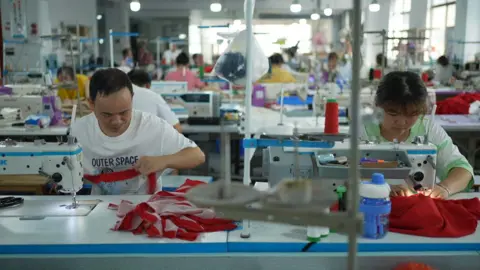Donald Trump has been actively reshaping the balance of presidential authority. Supporters view this as intentional.
Anna Moneymaker/Getty Images/Getty Images North America
hide caption
toggle caption
Anna Moneymaker/Getty Images/Getty Images North America
No one can deny he was transparent about it.
“It’s beneficial to have a strong leader at the forefront of a nation,” then-candidate Donald Trump stated at a campaign rally in New Hampshire in January 2024.
During his successful campaign comeback, Trump continuously praised authoritarian leaders, promising to dismantle the administrative state and seek retribution against political adversaries. When Fox News host Sean Hannity asked if he would promise never to “abuse power for retribution” in 2023, he replied, “Except from day one.”
“We will secure the border and drill, drill, drill. Beyond that, I’m not a dictator. Understood?” Trump added.
Since taking office just over seven weeks ago, the re-elected president has initiated an unprecedented offensive against the functions of the executive branch: challenging the Justice Department’s autonomy, dismissing independent inspectors general across 18 federal agencies, effectively closing down oversight bodies like the Consumer Financial Protection Bureau, and attempting to seize control over independent regulatory agencies such as the Securities and Exchange Commission and the Federal Election Commission.
“These actions are igniting legal conflicts over the limits of executive power,” stated Tara Malloy, who heads appellate litigation at the Campaign Legal Center, a government watchdog organization.
“However, it’s important to recognize that these aren’t merely abstract legal discussions,” Malloy emphasized. “This administration is looking to exert dominance and authority over federal government operations in an unparalleled manner.”
The Campaign Legal Center is particularly critical of Trump’s attempts to oust Ellen Weintraub, the chair of the Federal Election Commission. Malloy pointed out that independent bodies cannot be both impartial law enforcers and only accountable to the president.
“One can see the inherent unfairness. If the Biden administration had exerted presidential control over the FEC, would Trump have thought his 2024 campaign was being treated fairly? This seems fundamentally contrary to all that we understand about Trump.”
The argument for a more ‘energetic’ executive
Trump’s actions have caused turmoil within the executive branch, but there is a theory that encompasses it all, according to John Yoo, a conservative legal academic who worked in the Justice Department under George W. Bush.
Before Watergate, U.S. presidents faced far fewer restraints on their authority. Following President Nixon’s resignation due to scandal over abuses of power, Congress—controlled by Democrats at that time—devoted years to passing laws to curb presidential power, such as establishing inspectors general in federal agencies to monitor waste and misconduct.
“We continue to operate under those laws today, and one perspective to consider Trump’s actions is that he is trying to break through the constraints imposed on the presidency post-Watergate, although I am not suggesting he is consciously aware of this,” Yoo remarked.
This notion, labeled the “unitary executive theory,” has long been favored within far-right conservative circles and promoted in the conservative initiative Project 2025, but it is currently being examined in practice by the Trump administration.
The argument, as presented by supporters like Yoo, is that the Constitution allocates the power of the executive branch to a single individual, the president, and therefore that individual should have the authority to govern the executive branch at will. Simply put: the president can hire or fire anyone at their discretion.
“While this can indeed carry risks, the founders believed the benefits of having one individual capable of acting swiftly and decisively outweighed such risks,” said Yoo. “Hamilton famously stated that good governance is characterized by ‘energy in the executive.’ To maintain that energy, power must reside within one person.”
Deputy White House Chief of Staff Stephen Miller articulated the administration’s perspective on Trump’s authority during a February 20 press briefing while discussing cuts initiated by White House adviser Elon Musk as part of his government efficiency project.
“A president is elected by the entire American populace. He is the only official elected by the entire nation,” Miller pointed out. “Judges are appointed, and members of Congress are elected at the district or state level. Just one person. The Constitution’s Article Two includes a clause known as the vesting clause, which states that ‘The executive power shall be vested in a president,’ singular. The complete will of democracy is embodied in the elected president, who then appoints staff to implement that democratic will throughout the government.”
He further characterized tenured civil servants “who believe they are answerable to no one” as a “threat to democracy.”
Watchdogs raising concerns
Watchdogs assert that Trump’s actions are producing a chilling effect on government entities dedicated to combating corruption and on the officials remaining in these agencies, who are waiting to see the unfolding consequences.
“It isn’t insignificant that early targets of the Trump administration included the leaders of agencies responsible for protecting whistleblowers and preventing corruption and misconduct. What’s significant is the message sent to all those remaining in those roles,” commented Danielle Brian, Executive Director of the Project on Government Oversight, which investigates corruption. “All the structures and laws established to combat corruption and misuse of power are being explicitly targeted and eroded.”
Scott Greytak, Director of Advocacy for Transparency International U.S. and a legal advocate against corruption, took a more cautious stance.
“Multiple indicators don’t necessarily signify an interconnected pattern, and I’m hopeful there isn’t a coordinated effort, but it’s too early to provide a definitive assessment,” he noted. “I don’t believe we are witnessing a comprehensive, government-wide conspiracy of corruption at this point. We might discover more in the coming months.”
Additionally, the Trump administration has yet to issue an executive order establishing ethical standards for his administration and high-level political appointees—an action typically taken by presidents—despite having the highest number of billionaires in any cabinet in history, many of whom face financial conflicts while in office.
“While I am not claiming corruption exists within the administration, it undeniably heightens the risk of at least an appearance of corruption, and that necessitates accountability, ensuring the government operates in the public interest,” stated Daniel Weiner, Director of the Elections and Government Program at the Brennan Center for Justice, a center-left research organization.
Who sought this?
There is scant evidence that the American public is demanding a more powerful president.
In fact, surveys suggest voters are comfortable with the current distribution of powers. According to 2024 polling conducted by Vanderbilt University’s Unity poll, only six percent of Americans support increasing presidential authority, while a significant majority—63 percent—prefer the existing arrangement.
Recently, a UJ poll indicated that a slim majority of Americans, 52%, feel Trump has overstepped his presidential powers. However, a second-term president is less constrained by public opinion since he cannot run for another term (although Trump has repeatedly hinted at potentially challenging the two-term constitutional limit).
For now, the restraint on Trump’s authority exists within federal courts, where over 100 lawsuits contesting his executive actions are ongoing.
However, the judicial process is typically slow, and Trump has been vocal in his criticism of judges, as has his advisor Elon Musk, who has openly called for certain judges to face impeachment for rulings that have delayed or hindered Trump’s efforts to reshape the federal government.
What’s at stake
Many lawsuits are currently making their way through federal courts, contending the actions of the Trump administration, but Yoo asserted that this is part of Trump’s strategy.
“Trump is clearly orchestrating a trial case aimed at the Supreme Court,” Yoo said, explaining that the administration is likely to challenge a 1935 Supreme Court decision that restricts a president’s ability to remove certain officials within the executive branch. A 6-3 conservative Court may provide a more favorable environment for Trump in this legal confrontation, and the Court has shown support for these arguments in recent years.
In 2020, the Court affirmed the president’s authority to dismiss the head of the CFPB. “It’s as though Trump is responding to the Supreme Court’s invitation to gauge if independent agencies can remain within our 18th-century constitutional framework,” Yoo commented.
The Supreme Court has also granted Trump near-absolute power over the Justice Department in a 2024 ruling concerning presidential immunity, including the ability to have discussions regarding criminal cases and enforcement actions.
If Trump successfully dismantles or modifies the constraints put on the presidency in the post-Watergate era, it could lead to a new chapter in American politics devoid of significant independent checks on the president and politicized federal agencies.
Future accountability might arise in two forms: at the ballot box and through the other branches of government. Voters have the power to remove unpopular presidents, and Congress maintains the authority to enact laws to limit presidential power or utilize impeachment to remove a president.
While this may hold true for future presidents, Trump, as a second-term leader, is less influenced by public sentiment, and a Congress dominated by his party is more likely to yield to executive demands.
Yoo acknowledged that the trend of expanding executive power is not exclusively beneficial to one political party.
“Historically, it was Democrats—following World War II, especially under FDR, Truman, Kennedy, and LBJ—who championed the unitary executive concept, while Republicans like Taft were opposed to it,” he noted. “Thus, I don’t consider this a binary Democratic-Republican issue. These changes could ultimately serve a Democrat president’s interests in the future.”










 Bengali (Bangladesh) ·
Bengali (Bangladesh) ·  English (United States) ·
English (United States) ·